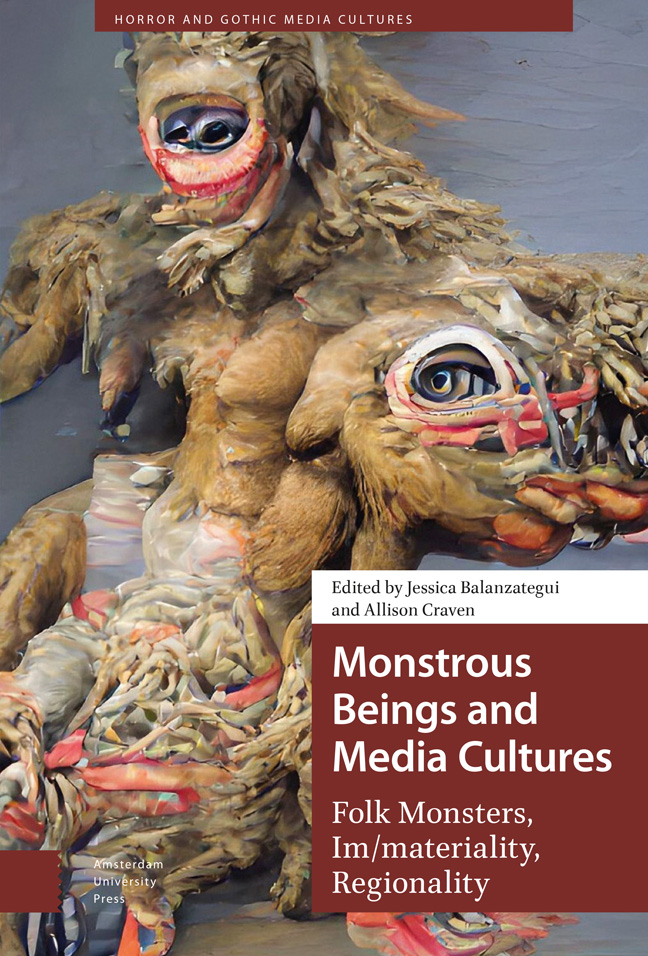Book contents
- Frontmatter
- Contents
- List of Figures
- Acknowledgements
- Introduction: Folk Monsters and Monstrous Media: The Im/materialties, Modalities, and Regionalities of Being(s) Monstrous
- 1 The Momo Challenge as Urban Legend: Child and Adult Digital Cultures and the Global Mediated Unconscious
- 2 “Every Imaginable Invention of the Devil”: Summoning the Monstrous in Eurocentric Conceptions of Voodoo
- 3 The Forest and the Trees: The “Woods” as Intersection between Documentary, Fairy Tale, and Internet Legend in Beware the Slenderman
- 4 Mark Duplass as Mumblegore Serial Killer: Fictional Vernacular Filmmaking in the Creep Series
- 5 Monsters in the Forest: “Little Red Riding Hood” Crimes and Ecologies of the Real and Fantastic
- 6 A Mother's Milk: Motherhood, Trauma, and Monstrous Children in Folk Horror
- 7 Documenting the Unheard: The Poetics of Listening and Empathy in The Family
- 8 Reimagining the Pontianak Myth in Malaysian Folk Horror: Flexible Tradition, Cinema, and Cultural Memory
- 9 An Uncommon Ancestor: Monstrous Emanations and Australian Tales of the Bunyip
- 10 The Folk Horror “Feeling”: Monstrous Modalities and the Critical Occult
- Works Cited
- Mediagraphy
- Index
9 - An Uncommon Ancestor: Monstrous Emanations and Australian Tales of the Bunyip
Published online by Cambridge University Press: 17 February 2024
- Frontmatter
- Contents
- List of Figures
- Acknowledgements
- Introduction: Folk Monsters and Monstrous Media: The Im/materialties, Modalities, and Regionalities of Being(s) Monstrous
- 1 The Momo Challenge as Urban Legend: Child and Adult Digital Cultures and the Global Mediated Unconscious
- 2 “Every Imaginable Invention of the Devil”: Summoning the Monstrous in Eurocentric Conceptions of Voodoo
- 3 The Forest and the Trees: The “Woods” as Intersection between Documentary, Fairy Tale, and Internet Legend in Beware the Slenderman
- 4 Mark Duplass as Mumblegore Serial Killer: Fictional Vernacular Filmmaking in the Creep Series
- 5 Monsters in the Forest: “Little Red Riding Hood” Crimes and Ecologies of the Real and Fantastic
- 6 A Mother's Milk: Motherhood, Trauma, and Monstrous Children in Folk Horror
- 7 Documenting the Unheard: The Poetics of Listening and Empathy in The Family
- 8 Reimagining the Pontianak Myth in Malaysian Folk Horror: Flexible Tradition, Cinema, and Cultural Memory
- 9 An Uncommon Ancestor: Monstrous Emanations and Australian Tales of the Bunyip
- 10 The Folk Horror “Feeling”: Monstrous Modalities and the Critical Occult
- Works Cited
- Mediagraphy
- Index
Summary
Abstract
“Bunyip” is an Australian English word derived from First Nations language names for monstrous water spirits that inhabit inland waterways of southeastern Australia. But the “Bunyips” that proliferate in colonial literary fictions, especially children's stories, are what Elspeth Tilley (2009) terms an “Aboriginalist creation of white folklore” and greatly diverge from biocultural knowledges of water spirits. The chapter explores this history of appropriation and then turns to recent literature and screen media by First Nations creatives which bring ancestral spirits into contemporary media. The main case study is Shadow Trackers (Curtis 2016), a documentary television show that resembles the format of paranormal reality television but educatively addresses bi-cultural audiences about the power and presence of spirit beings.
Keywords: Bunyip, water spirits, colonial literature, ancestral, Indigenous Television
“Every one [sic] who has lived in Australia has heard of the Bunyip.” (Praed 1891, 271)
Bunyip is the Australian English name for monstrous water spirits that inhabit inland waterways of southeastern Australia (Judd 2019, 112). The word bunyip is thought to be derived from banib in Wemba Wemba language from Western Victoria (Clarke 2018, 35), and similar beings are known by different names in wider parts of southeastern Australia. All monstrous beings from Tjukurpa (or, the Dreaming – see Introduction) are “inextricably connected to specific locations, territorial bases, or ‘country’ as it is known in Aboriginal English” (Nicholls 2020, 91). Barry Judd explains that Aboriginal biocultural knowledge of river systems was “often mapped out and understood in reference to the localities” where “the spirit creatures were said to inhabit” and that descriptions and drawings of it “indicate that the bunyip is something to be feared” (2019, 112).
However, the wide appropriation of the Bunyip in oral narratives, ethnologies, news reports, and narrative literary fictions, especially children's books and stories, since the early nineteenth century collectively constitutes what Elspeth Tilley (2009) terms an “Aboriginalist creation of white folklore” (35). It is reproduced in all variety of literary, civic, and popular culture and vernacular creations and folk art and is sometimes syncretised with Yowies and other settler folklore of the bush (see, for instance, Holden 2001). This folklore is largely unrelated, or related only in token ways, to biocultural knowledge of bunyip.
- Type
- Chapter
- Information
- Monstrous Beings and Media CulturesFolk Monsters, Im/materiality, Regionality, pp. 217 - 240Publisher: Amsterdam University PressPrint publication year: 2023



